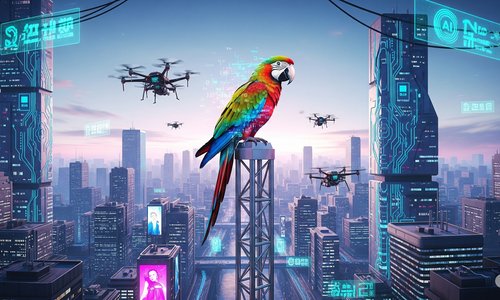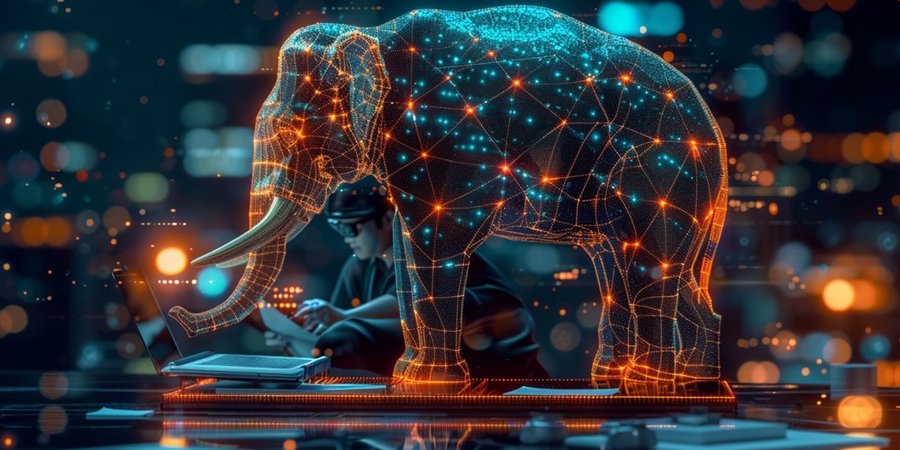
A Promessa e o Perigo da Nova Revolução Digital
A nova corrida tecnológica global levanta uma pergunta urgente: estamos prontos para confiar na inteligência que criamos?

O sistema capitalista, com todas as suas vantagens e imperfeições, se destaca pela sua capacidade de imitar a natureza. Assim como as espécies que se adaptam e evoluem para sobreviver, as empresas que conseguem se adequar ao meio, tornando-se mais eficientes em um ambiente de competição, tendem a prevalecer. A ideia aqui não é a de discutir se devemos aperfeiçoar ou substituir esse sistema, mas sim a refletir sobre como ele incentiva a inovação e a busca constante por melhorias. E é nesse contexto que a revolução da inteligência artificial (IA) está e continuará a transformar o setor financeiro, trazendo uma nova era de produtividade e eficiência.
O setor financeiro vive um entusiasmo palpável com o potencial da IA , especialmente a IA generativa (GenAI), um tipo de Inteligência Artificial que é treinada em bases de dados enormes e tem a capacidade de gerar novos conteúdos, e entre outras coisas, compreender e processar a linguagem humana. Esse novo pacote de tecnologias tem o potencial de transformar as tarefas rotineiras, especialmente no âmbito de empresas de serviços.
Imagine a rotina dos escritórios sendo revolucionada por ferramentas que, em vez de simplesmente executar comandos, antecipam necessidades, organizam informações e automatizam processos com uma precisão e eficiência inéditas. Este é o potencial da GenAI: transformar as atividades administrativas em algo quase mágico, libertando tempo e recursos para a inovação e a criatividade.
A ideia de ter uma ferramenta que possa não só realizar tarefas repetitivas, mas também oferecer insights e otimizar processos complexos, tem o potencial de transformar o modo como as instituições financeiras operam. Não se trata apenas de automação, mas de uma verdadeira parceria entre humanos e máquinas, onde a IA age como um copiloto, guiando e potencializando as capacidades humanas.
Para entender melhor o impacto dessa transformação, o "2024 Work Trend Index Annual Report" da Microsoft e LinkedIn fornece uma visão abrangente sobre a adoção de IA no ambiente de trabalho. O relatório é baseado em uma pesquisa que envolveu 31 mil “trabalhadores do conhecimento” de diversas indústrias em mais de 30 países. Trabalhadores do conhecimento é um novo conceito que esse relatório destaca. Trata-se de profissionais cujo principal capital é o conhecimento. Eles utilizam suas habilidades cognitivas para resolver problemas complexos, tomar decisões informadas e inovar dentro de suas áreas de especialização. No setor financeiro, isso inclui analistas financeiros, consultores de investimentos, gestores de risco, auditores e outros profissionais que dependem de informações precisas e análises detalhadas para tomar decisões estratégicas.
Dados recentes mostram que o uso de GenAI no trabalho praticamente dobrou nos últimos seis meses, com 75% dos trabalhadores do conhecimento utilizando IA. Isso se deve aos benefícios tangíveis que a IA oferece: 90% dos usuários relatam que a IA ajuda a economizar tempo, 85% dizem que melhora o foco em trabalhos importantes, 84% que aumenta a criatividade, e 83% que torna o trabalho mais agradável.
Estamos vivendo uma era onde as ferramentas de IA estão ou serão embutidas em praticamente todas as aplicações e dispositivos que usamos, muitas vezes de maneira transparente para o usuário. A imagem de agentes de Inteligência Artificial famosos como o Hal 9000 de "2001: Uma Odisseia no Espaço" ou o Jarvis, companheiro inseparável de Tony Stark em "Homem de Ferro" e outros filmes da Marvel, vem à tona. Agora, esses personagens não são mais meras peças de ficção, mas conceitos cada vez mais próximos da realidade.
Um exemplo atual e tangível deste ideal de integração é o Copilot da Microsoft. Como o próprio nome sugere, o Copilot atua como um copiloto digital, ajudando a extrair o máximo de nossas ferramentas com rapidez, precisão e eficiência. Ele não é apenas uma ferramenta passiva, mas um agente proativo que facilita a criação de documentos, planilhas, apresentações e muito mais.
Com o Copilot, e outros Agentes de IA embutidos, a execução de tarefas rotineiras como a criação de um relatório detalhado, a preparação de uma apresentação convincente ou a gestão de um fluxo de trabalho complexo torna-se uma tarefa simplificada, e rápida. Agentes de IA podem sugerir melhorias, automatizar etapas e garantir que os resultados sejam de alta qualidade. Essa presença omnipresente da IA está mudando a forma como interagimos com a tecnologia, transformando-a em uma extensão natural de nossas capacidades.
De maneira interessante e ao mesmo tempo preocupante, muitos funcionários estão trazendo suas próprias ferramentas de IA para o trabalho, mesmo sem a aprovação oficial das suas empresas. Isso indica um sentimento de urgência e ansiedade, onde os benefícios percebidos superam as preocupações com governança e segurança. Essa prática, embora mais comum em pequenas e médias empresas, onde 80% dos trabalhadores adotam essa abordagem, acontece em todos os tamanhos de empresa e setores. Os impactos desta aceleração no uso de IA desconectados a preocupações de governança ainda são incertos.
Porém, a revolução vai além da eficiência e da produtividade. A verdadeira promessa dos copilotos digitais é a possibilidade de um trabalho mais humanizado e criativo. Ao automatizar as tarefas burocráticas e tediosas, a IA pode permitir que os profissionais se concentrem no que realmente importa: a inovação, a resolução de problemas complexos e a interação significativa com clientes e colegas.
Segundo o relatório, dentre aqueles usuários frequentes de IA (uso com grande frequencia e diversas vezes na semana com economias superiores a 30 minutos por dia), 92% deles, a esmagadora maioria, afirmam que a IA aumenta a criatividade, e 91% dizem que a IA os ajuda a se sentirem mais motivados e a aproveitarem mais o trabalho.
No Brasil, 88% dos profissionais com o perfil de usuários frequentes afirmam que iniciam o dia deles com IA, e 91% utilizam ferramentas de IA para ajudá-los a se preparar para o dia seguinte.
No setor financeiro, essa mudança é especialmente relevante. Com uma mentalidade digital, uma competição acirrada e uma busca incessante por rapidez e precisão, o ambiente está pronto para acolher essa transformação. Os copilotos digitais podem ser o impulso necessário para uma nova era de trabalho, onde a tecnologia suporta e amplifica a criatividade e a capacidade humana.
Estamos à beira de uma transformação profunda. A revolução da IA no setor financeiro não é uma promessa distante, mas uma realidade em construção. O entusiasmo pelo potencial da GenAI, a integração de ferramentas de IA em todas as aplicações e a mudança comportamental no ambiente de trabalho apontam para um futuro onde o trabalho é mais eficiente, preciso e, acima de tudo, humano.
Por outro lado, o relatório revela que 60% dos líderes temem que suas organizações careçam de um plano e visão claros para implementar a IA, o que gera um sentimento ambíguo, uma mistura de angústia e incerteza com entusiasmo e expectativas. Esse é um ponto de atenção: nunca antes líderes com uma profunda compreensão dos impactos e envergadura das mudanças que estamos vivendo foram tão necessários.
No coração dessa transformação estão os agentes generativos que prometem não apenas automatizar tarefas, mas também liberar o potencial humano para a criatividade e a inovação. O setor financeiro, com sua necessidade intrínseca de eficiência e rapidez, está liderando essa revolução, e aqueles que enfrentam o desafio de frente têm a oportunidade de se destacar, mostrando que a magia da tecnologia está aqui para transformar nossa maneira de trabalhar e viver.
Mais detalhes sobre o relatório: “2024 Work Trend Index Annual Report" da Microsoft e LinkedIn” - https://assets-c4akfrf5b4d3f4b7.z01.azurefd.net/assets/2024/05/Microsoft_2024_Work_Trend_Index_Annual_Report_663b79bdc8f91.pdf
Conselheiro fundador da I2AI – Associação Internacional de Inteligência Artificial. Também é sócio-fundador da Engrama, sócio da Startup Egronn, e na consultoria Advance e investidor na startup Agrointeli . Tem mais de 20 anos de experiência em multinacionais como Siemens, Eaton e Voith, com vivência em países e culturas tão diversas como Estados Unidos, Alemanha e China.
Palestrante internacional, professor, pesquisador, autor, empreendedor serial, e amante de tecnologia. É apaixonado pelo os temas de Estratégia, Inteligência Competitiva e Inovação.
É Doutor em Gestão da Inovação e Mestre em Redes Bayesianas (abordagem de IA) pela FEA-USP. É pós-graduado em Administração pela FGV e graduado em Engenharia Mecânica pela Unicamp.

A nova corrida tecnológica global levanta uma pergunta urgente: estamos prontos para confiar na inteligência que criamos?

Por que dominar a IA será a nova alfabetização do século XXI

Conselhos de Administração devem evoluir da supervisão reativa para a antecipação estratégica, frente à crescente complexidade e volatilidade dos ambientes de negócios.

De 14 a 25 de julho, reserve suas manhãs das 08h00 às 09h30 para participar da tradicional Maratona I2AI! Uma jornada intensa com debates e palestras sobre temas essenciais: Ética,